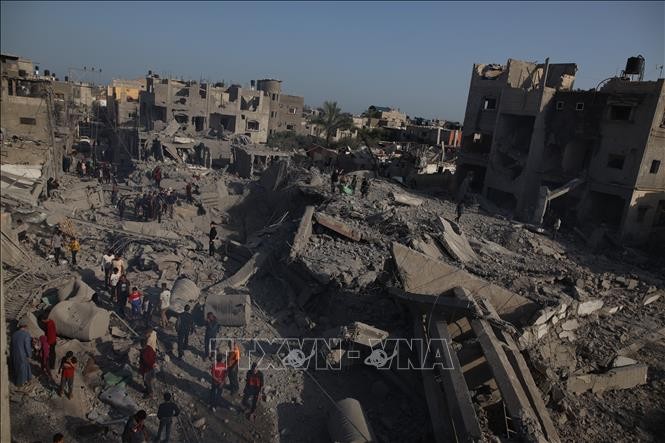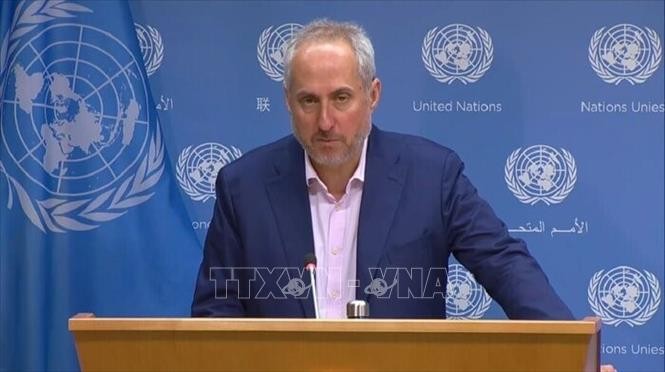(VOVWORLD) - The Hamas-Israel conflict has been going on for 6 months. Casualties on both sides have mounted but diplomatic negotiations are at a standstill.
 An Israeli air strike destroys an area in Deir el-Balah city in the Gaza Strip on April 2, 2024. (Photo: XNA/VNA) An Israeli air strike destroys an area in Deir el-Balah city in the Gaza Strip on April 2, 2024. (Photo: XNA/VNA) |
On October 7, 2023, the Israeli army launched a military campaign in the Gaza Strip in retaliation against a surprise Hamas attack on Israel which ignited the most serious conflict in the Middle East in many years.
Serious humanitarian crisis
In the six months since the conflict broke out, the international community has repeatedly decried the loss of life and property in the Gaza Strip as “unacceptable”. Data from the UN and the Palestinian Health Authority in Gaza show that as of the end of March, 33,000 Palestinians had died, most of them civilians.
UNICEF has reported that 13,000 children have been killed in Gaza in the past 6 months, more than in almost any other conflict in the world in the past decade. More than 75,000 people have been injured and 1.9 million people, 85% of Gaza's 2.3 million residents, have had to flee their homes.
More than a thousand Israeli soldiers and civilians have died, and hundreds of hostages are being held by Hamas forces.
The infrastructure in Gaza has been seriously damaged. A report by the UN and the World Bank released on Tuesday showed that 62% of the homes in Gaza have been damaged or destroyed, leaving more than 1 million people homeless.
None of Gaza’s 625,000 children can go to school, as 56 schools have been destroyed and more than 200 badly damaged. The World Bank estimates that 18.5 billion USD worth of damage has been done to essential infrastructure, equivalent to 97% of the combined 2022 GDP of the Gaza Strip and the West Bank.
A critical shortage of health care, clean water, and food has made life miserable for millions of people in Gaza.
“It's heart-breaking...the suffering of the people in Gaza is unconscionable,” said UN Human Rights Office spokesperson Jeremy Laurence.
Relief efforts are hampered by the severity of the conflict and obstacles on many sides. The World Food Program says the food supply to Gaza is only 20% of what is needed. Aid workers have themselves become victims. 190 humanitarian aid workers have died in Gaza in the past 6 months. On Tuesday, seven employees of the World Central Kitchen were killed by an Israeli air strike.
“The risks to humanitarian workers have been there for months. This is just a very clear and illustrative example of the deadly challenges that humanitarian workers face every day in Gaza, be they internationals, or as most of them are, Palestinians,” said UN spokesman Stephane Dujarric.
 UN spokesman Stephane Dujarric (Photo: IRNA/VNA) UN spokesman Stephane Dujarric (Photo: IRNA/VNA) |
Diplomatic deadlock
Diplomatic efforts by the international community have failed to achieve a lasting ceasefire between Israeli and Hamas forces. The latest negotiations, sponsored by Qatar, Egypt, and the US, ended on Wednesday in Cairo without any progress. The division is clearly seen at the United Nations, where it took nearly 6 months for the Security Council to pass a resolution demanding an immediate ceasefire in Gaza. Getting both sides to implement the resolution remains a big challenge.
Observers say that while a long-term ceasefire and the release of all hostages have been impossible to achieve so far, current pressures can help to improve the humanitarian situation in Gaza. A tougher US stance toward Israel might force Tel Aviv to make some concessions.
“With the regard to policy in Gaza, if we don't see the changes that we need to see, there'll be changes in our policy,” US Secretary of State Antony Blinken said.
Since late last year, Houthi forces in Yemen have been attacking Western military vessels and commercial ships in the Red Sea in retaliation for Israel's military operations, causing a disruption of global trade.
On the border between Israel and Lebanon, clashes between the Israeli army and Hezbollah forces continue.
Israel's recent air strikes on Iranian targets in Syria have increased the risk of a more direct confrontation between those two Middle East military powers.